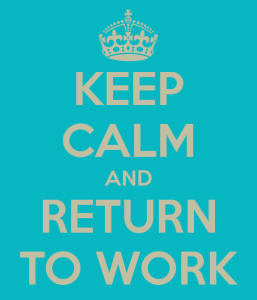I’m excited to have Kate Pletcher, executive recruiter and founder and CEO of Treehouse Partners, a Los Angeles based executive search firm, provide her insights on career re-entry from the point of view of a recruiter. — Jennifer Bevan, Career Coach & Founder Path Relaunch
 There are an unlimited number of reasons why you might decide to step off the career track. It could be for maternity leave, family issues, or just a well-needed break from the daily grind. Often a short break might turn into multiple years and suddenly you are faced with the daunting task of stepping back into the workforce even though much has changed.
There are an unlimited number of reasons why you might decide to step off the career track. It could be for maternity leave, family issues, or just a well-needed break from the daily grind. Often a short break might turn into multiple years and suddenly you are faced with the daunting task of stepping back into the workforce even though much has changed.
After an extended time away, you might realize your goals have changed or your prior experience is less relevant now. All of this adds up to a stressful situation where you need to reevaluate your career goals and priorities and form a plan to take that huge leap of starting again (from closer to scratch than you may like).
Whether the break has been 6 months or 15 years, it will lead to many of the same feelings. Here are our 7 Treehouse Tips for an easy transition back to work:
1. Analyze Your Decision
Take time to reflect and evaluate your decision to return to work. Think about what your goals are, and what kind of support you have around you. During this process, seek the counsel of friends, family members, and mentors who know you well. An experienced career coach can be an objective third party who can help you evaluate your values and goals, move past confidence gaps and guide you through career exploration. Ask those you trust to tell you honestly what they view as your strengths and look for job opportunities that align with those strengths.
2. Find Your Rockstar Confidence
After not working for a while, you might lose your faith in your skills as a professional. It is important to find that confidence again before you start the job search. Reading old performance reviews that detail your strengths and talents can do wonders for your confidence. Believe it or not, freshening up your wardrobe may help as well. We recently placed a candidate who hadn’t interviewed for a job in nearly 8 years… part of the preparation advice we gave her was to buy a new “power suit” for the interview – it worked! Think back to how you felt when you were doing a great job at work and plug back into those feelings!
3. Be Realistic
While confidence is key, it’s also important to be realistic about your expectations for this next stage. It is unlikely that you will find your next job overnight and making a drastic career shift with limited recent work experience to justify the shift will be difficult. For example, we had a candidate apply to a graphic design job once who indicated that her love for and proficiency at scrapbooking was her primary motivator for applying… however, all of her professional experience had been as an accountant! A more realistic move for her would have been to start a portfolio of graphic design work through paid or pro-bono projects to get the experience. Focus on the professional skills you already have and can leverage to help a company’s bottom line vs. exclusively focusing on roles you think you would like.
4. Update Your Skillset
Whether you’re looking to re-enter into the same functional area, or making a shift, it will be important for you to have some recent and relevant professional experiences. These can be obtained in a variety of ways – e.g. through volunteering, helping out a friend’s small business, or taking a class. It’s important to demonstrate your ability to pick up new skills and the network you build in the process could lead you to your next big role!
5. Add Relevant Skills to Your Resume
Although in an interview you will have a chance to explain why you have had a long break, the resume will be the first representation of your career history the employer sees. Focus on your transferrable skills and successes and add experience from volunteer work and part-time projects to fill in employment gaps.This way your break from the workplace won’t be the first impression.
6. Be Bold!
In order to get that first interview, you will have to put yourself out there again. Sending your resume out is not enough. Network with extreme enthusiasm by telling people of your plan to return to work. If you are exploring new career paths, set up informational meetings and go to conferences so you can do your research and expand your network. Reconnect with former colleagues and bosses. Make sure you are taking every opportunity that may lead to your next dream job.
7. Take Your Interview to the Next Level
Since a hiring manager will be considering you over applicants who have current and relevant experience, you need to make sure you stand out. Do as much research as possible on the company and know the background of everybody you are interviewing with. Make sure to not focus on why you took a break – instead talk about your achievements and how you can add value to the organization.
Remember, take your time to take this next step of your career down a path you really want! Don’t just accept the first job you receive out of eagerness to start again. This is a great time to evaluate what you really want out of your career and make decisions accordingly.
Good luck!
